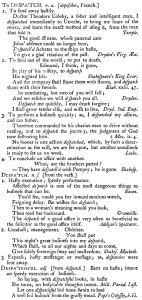Difference between Dispatch and Despatch
Whilst browsing an online auction site, okay so it was eBay, I spotted an ad that irked me. It was for yet another rival parcel delivery service or postal services aggregator/comparison site – competition is certainly keeping the prices down, especially of sending high heeled shoes through the post, the Royal Mail has recently specifically discounted a shoe box sized parcel! The ad in question was for despatchbay.com, named to sound like eBay rather than PirateBay one assumes – since the latter might suggest the stealing of goods rather than their dispatch, and the alternate meaning of dispatch – “to kill with quick efficiency” (Merriam-Webster, attested since the 1520s).
 Perhaps they chose Despatch Bay over Dispatch Bay because the latter was already in use, by The Dispatch Bay, a UK-to-Pakistan specific courier business:
Perhaps they chose Despatch Bay over Dispatch Bay because the latter was already in use, by The Dispatch Bay, a UK-to-Pakistan specific courier business:
 Although, I doubt they give it much thought, given how badly punctuated the website of the brand-owning company, The SaleGroup, is. Their tagline is “The Benchmark For Online Business” and yet we spotted half a dozen errors on a single page alone. They “eat, sleep and breathe the internet”, but I think they were ‘sleeping‘ during their proofreading.
Although, I doubt they give it much thought, given how badly punctuated the website of the brand-owning company, The SaleGroup, is. Their tagline is “The Benchmark For Online Business” and yet we spotted half a dozen errors on a single page alone. They “eat, sleep and breathe the internet”, but I think they were ‘sleeping‘ during their proofreading.
This brings me to my professional pedant‘s persnicketiness (a much better word than pernickety, the extra ‘s’ in there, added around 1915, sounds so much more sinister and sneaky). My issue is that ‘despatch‘ just looks and sounds wrong, compared to (or with?) the more traditional, and so I thought, correct, ‘dispatch‘. So I went on an authoritative and exhaustive examination of the facts, i.e., I googled it.
Despatch a variant spelling of Dispatch?
My initial inquiry – or rather enquiry in British English to be ever so slightly pedantic, led me to believe that ‘despatch‘ was just a less common variation of ‘dispatch‘ and more typically British, in about a third of its millions of uses. So says the usually excellent Grammarist, anyway – the comments on their post are worth reading alone for how the discussion got into whether ‘despatch‘ was a noun or verb in some instances and for the commendable digression onto “a box of frogs and a shipment of drugs” whilst on “whacky baccy”! But I was not convinced.
Despatch Box
The specific use of the phrase “Despatch Box” when referring to the UK and Australian Parliamentary speaking lecturn lectern/rest and documents boxes (though now containing a Bible used for oaths) dates from the 17th century in Britain (although the current boxes were gifts from New Zealand after the existing ones were destroyed by a German bomb in 1941) and as a gift from King George V to Australia in 1927. I’ve not been able to prove a consistent early provenance of Despatch over Dispatch Box, but Despatch Box seems to have stuck in the British Parliament now. A historic anomaly, perhaps? What not “an historic anomaly” – well that is another grammar, style, and usage question entirely!
Dispatch and Despatch according to the Dictionary
A user on the StackExchange English Language & Usage site writes: “The OED lists both spellings with equal status. ‘Dispatch’ is by far the more common spelling, uniquely so in the 16th, 17th, and 18th-century examples. ‘Despatch’ seems to have become fashionable in the late Victorian period.”
I would place the fashion as late 18th century though, due to the influence of the lexophile, Dr Samuel Johnson. Allegedly, the variant spelling arose due to a printing error in Dr Johnson’s Dictionary of the English Language (1755), which brought both spellings into wider usage by adding legitimacy to the des- spelling. Prior to that, spelling was hardly rigidly enforced.
Of the digital entries transcribed so far in an online version of the dictionary, ‘dispatch‘ occurs 8 times to a singular occurrence of ‘despatch‘ when used to define other words. As a dictionary entry itself, it only occurs under ‘despatch‘, there being no entry for ‘dispatch’ at all.
 Upon reviewing Johnson’s examples of the use of ‘despatch‘ in Shakespeare’s King Lear and the King James Version Bible (1611) it appears it was Johnson’s spelling, not the original’s he was citing, for though he has ‘despatch‘ in Ezekiel 23:47, the original KJV had:
Upon reviewing Johnson’s examples of the use of ‘despatch‘ in Shakespeare’s King Lear and the King James Version Bible (1611) it appears it was Johnson’s spelling, not the original’s he was citing, for though he has ‘despatch‘ in Ezekiel 23:47, the original KJV had:
“And the companie shall stone them with stones, and dispatch them with their swords: they shall slay their sonnes and their daughters, and burne vp their houses with fire.”
It will no doubt remain a debate for some time to come, even if it was at first an error, it is now a common error, and perhaps more peculiarly British. Though one forum commentator described seeing it “in Australia, where in New South Whales [sic], I encountered ‘despatch‘ everywhere, and in Queensland and Victoria, the ‘common’ spelling was ‘dispatch‘.”
Even users of a business discussion forum got heated on the subject and no closer to a conclusion, each claiming dis- or des- was more British and dis- definitely American, and thus to be discouraged! In the end, their solution was to use ‘send’ or ‘post’ instead.
Etymology
It is alleged by many sources that the words both have legitimate but distinct origins, that ‘dispatch‘ came from the Italian word dispacciare and ‘despatch‘ from the Spanish word despachar. For example, the differencebetween.net website entry which, unfortunately, misspells one of them to confuse the situation further:
“The origins of both words are also different. ‘Dispatch‘ came from the Italian word ‘dispacciare’. On the other hand, ‘dispatch’ came from the Spanish word ‘despachar’.”
They correct themselves in their summary:
“‘Despatch‘ came from the Spanish ‘despachar’ while the Italian ‘dispacciare’ formed the basis and formed the modern word of ‘dispatch‘.”
To call the word ‘dispatch‘ “modern” is blatantly not true given the King James Bible and Shakespeare examples cited above and erroneously by Dr Johnson.
The second part of the word ‘-patch‘ is consistently spelt but variously attributed:
The exact source of the second element has been proposed as Vulgar Latin *pactare “to fasten, fix” or *pactiare, or as Latin -pedicare “to entrap” (from Latin pedica “shackle;” see impeach); and the Spanish and Italian words seem to be related to (perhaps opposites of) Old Provençal empachar “impede.” etymonline.com
Whatever the Latin root, the Spanish ended up with despachar “expedite, hasten” and the Italians dispacciare “to dispatch”, with little difference between des– and dis-, other than spelling.
Despatch, South Africa
As an aside, Despatch is also a small town in the Eastern Cape Province of South Africa situated between Port Elizabeth and Uitenhage, from where its main product was ‘dis-‘ or ‘despatched‘. Its name was derived from the late 1800s brick industry it became renowned for, and with which its bricks were imprinted.
Summary
It would seem in an international commerce age prudent to go with the more internationally and internet acceptable majority of ‘dispatch‘, particularly if some people’s reactions to seeing ‘despatch‘ is to think mistake or typo and thus give off a less professional image. Even if the OED says both are acceptable, it is impression and opinion that matter as much as legitimacy and a dubious history. For business purposes the 10-50x as many web searches and results done for ‘dispatch‘ over ‘despatch‘ would indicate that the former is a better SEO (Search Engine Optimisation) choice. To anyone who disagrees, may they be dispatched overseas!





